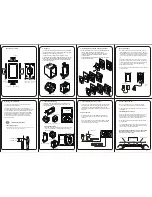
instabus EIB
Technical Product Information
April 2006
Touch panel UP 588
5WG1 588-2AB01
Touch panel UP 588/11
5WG1 588-2AB11
Touch panel UP 588/21
5WG1 588-2AB21
Accessories: Design frame, anodised aluminium
5WG1 588-8AB01
Technical Manual
UP 588, 6 pages
Siemens AG
Automation and Drives Group
Update: http://www.siemens.de/gamma
©
Siemens AG 2006
Electrical Installation Technology
Subject to change without prior notice
P.O.Box 10 09 53, D-93009 Regensburg
2.3.1.4/4
B1 Flush-type
box
B2 Opening for power supply cable
B3 Opening for bus cable
B4 Touch
panel
B5 Fixing
screws
B6 Design frame
B7 All-purpose
cover
Connecting the bus cable (Diagram 3 “A”)
−
The bus terminal (C3) is suitable for solid conduc-
tors with 0.6 ... 0.8mm Ø.
−
Remove approx. 3 cm of the insulation of the bus
cables.
−
Strip approx. 5mm of insulation from the conduc-
tors (C3.4) and place in the terminal (C3) (red = +,
grey = -).
Clipping on the bus terminal
−
Place the bus terminal in the guide slot and press
the terminal (C3) downwards until it reaches the
stop.
C3
C3.1
C3.3
C3.2
5 mm
C3
C3.4
C3
C3.4
"A"
C4.1
"B"
6....7mm
C4.2
C4
Diagram 4: Connections
Connecting the power supply terminal (Diagram 3 “B”)
−
Strip 6...7mm of insulation from the conductors
(C4.1), clip on the power supply terminals (C4) and
tighten the screws (C4.2).
Terminal assignment:
230V
24V
1
Earth
In1: +/- DC: AC
2 N
Neutral conductor
not connected
3 L Phase
In2: +/- DC: AC
After connecting the bus terminal and the power supply
terminal to the cables, the terminals are inserted in the
corresponding openings on the touch panel. Once the
bus voltage has been applied, the learning button can
be pressed and the physical device address can be pro-
grammed. The LED should be extinguished when the
physical address has been programmed.
The device is then screwed into the box using the four
screws supplied (see Diagram 2).
The protective foil that is attached to the surface of the
display may now be removed. No sharp objects or tools
should be used to do so.
After screwing the device into position and removing
the protective foil, the required design cover can be
inserted in the display frame. Finally, the all-purpose
cover is placed onto the display and latched in place,
thereby holding the design cover in position.
Caution:
Do not exert direct pressure on the display!
There is a risk of the glass breaking!
Once the installation is completed, the power supply
voltage can be connected to the supply and the device
can be put into operation (see the application program
description for information about programming).
Dismantling
-
First disconnect the power supply voltage from the
supply.
-
The all-purpose cover must first be removed when
dismantling the device or replacing the design
frame. The cover can be released at the openings
provided (D1) at the bottom using the dismantling
tool provided or a plastic screwdriver.
Caution:
When releasing the cover, only slight pres-
sure may be exerted on the display. Do not
damage the surface of the display with the
dismantling tool!
























